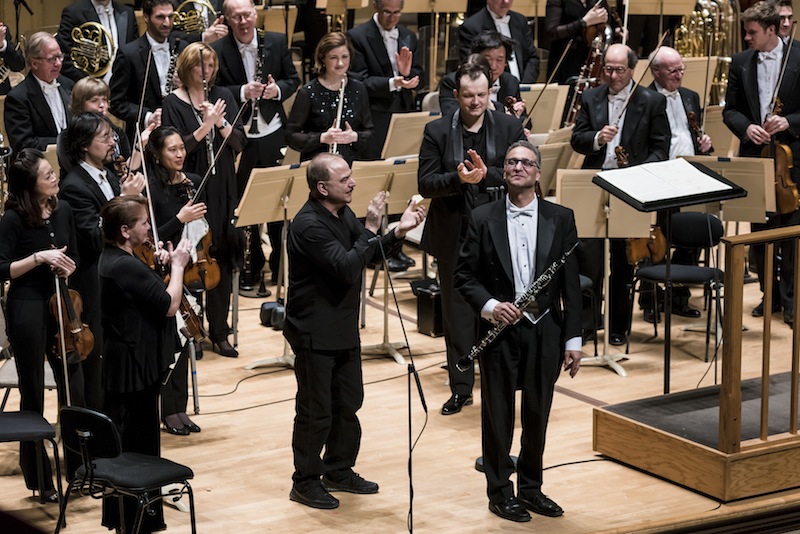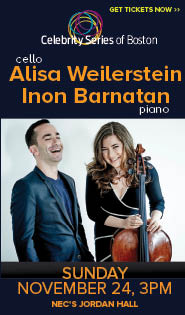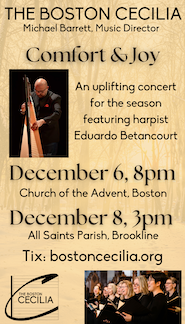English horn premiere provides an oasis in BSO’s night of Shakespearean tragedy

BSO Principal English horn Robert Sheena is applauded by composer George Tsontakis and music director Andris Nelsons following the world premiere of “Sonnets, Tone Poems for English Horn and Orchestra” Thursday night. Photo: Liza Voll
The English horn, the oboe’s deeper-voiced cousin, is the cream in the orchestra’s coffee, and for over two decades Robert Sheena has been admirably pouring that cream for the Boston Symphony Orchestra. Thursday night in Symphony Hall, Sheena, his colleagues, and BSO music director Andris Nelsons provided a meditative interlude in an evening of Shakespearean tragedy with the world premiere of George Tsontakis’s Sonnets, Tone Poems for English Horn and Orchestra.
The new work, commissioned by the BSO for Sheena, shared the bill with Strauss’s tone poem Macbeth, Dvořák’s overture Othello, and Tchaikovsky’s fantasy-overture Romeo and Juliet in the last of three BSO programs commemorating the 400th anniversary of Shakespeare’s death.
Tsontakis’s piece in four movements, each composed in contemplation of a sonnet by Shakespeare, studiously avoided calling itself a concerto or sounding like one.
For the most part, Sheena’s shapely phrases resembled the fine work he does every week for the orchestra, and Sonnets came across as a colorful orchestral piece with an unusual number of English horn solos.
The introverted character of the solo instrument challenged the composer to create orchestral environments where the English horn could shine. He succeeded repeatedly, with (for example) a halo of light percussion and harp around the soloist in the work’s opening bars, or a throb of low strings and gong in the second movement. And interplay between the soloist and the orchestral winds created some intriguing “Who’s playing now?” effects.
However, amid all this tasteful restraint, it must be said that when the soloist took a breather and the orchestra swung into a swirling, scintillating tutti the feeling of “kids out of school” was palpable.
Although the four sonnets Tsontakis selected sound similar themes of time’s passage, loss, and death, the composer fashioned quite distinct movements around them.
Sonnet 30, “When to the sessions of sweet silent thought,” prompted airy, dreamy music, the English horn lounging languidly like Debussy’s faun. The instrument’s middle-eastern origins evidently inspired the sinuous dance rhythms, exotic scales, and even a hint of Rimsky-Korsakov in Sonnet 12, “When I do count the clock that tells the time.”
It was in Sonnet 60, “Like as the waves make toward the pebbled shore,” a busy scherzo for the orchestra with only modest participation by the soloist, that one could most feel the composer resisting the urge to write a showy concerto.
Restlessness, dissonance, and a wavering figure on the interval of a minor second evoked the feelings of anxiety and jealousy in Sonnet 75, “So you are to my thoughts as food to life.” The soloist took the lead back from the orchestra, seemingly intoning Shakespeare’s poem one line at a time, in utterances less violent than, but from the same emotional place as, Dvořák’s Othello, heard earlier in the program.
Through it all, Sheena’s rich, round, yet focused tone enveloped one’s ears, and Nelsons made the most of composer Tsontakis’s imaginative orchestration. At the end, conductor, soloist, and composer all came on stage to acknowledge the enthusiastic applause, and the English horn player could not escape being hugged by his music director.
Not one but three pairs of “star-cross’d lovers” dominated the rest of the program, as both Strauss and Dvořák boiled their respective Shakespeare plays down mainly to the relationship between the male and female protagonists. Only Tchaikovsky widened his lens to include the context of warring clans in Romeo and Juliet.
A writer on Strauss, Michael Kennedy, called the composer’s first tone poem, Macbeth, “a work not of genius but of nascent genius.” And indeed, in the work’s slightly awkward, Schumann-like scoring, one caught only glimpses of the orchestral wizard Strauss would become.
The piece’s modified sonata form, with its assertive themes for Macbeth and lyrical, seductive ones for Lady Macbeth, hardly offers the big-canvas, multiple-character scenes familiar from this composer’s later tone poems.
Still, with a little imagination, one could imagine how this piece’s wayward harmonies and dissonances might have shocked listeners at its premiere in 1890. And if conductor Nelsons didn’t exactly find a narrative thread through the whole piece, he made every dramatic turn in the music tell.
Dvořák’s Othello, depicting not love thwarted by outside forces (as in Romeo and Juliet) but love eaten away from within by jealousy, originated as the tragic concluding work in a trilogy of overtures that included the more famous Carnival.
Unlike Macbeth, Dvořák’s piece revealed a composer in full command of his orchestral language, expertly contrasting passages of tension and dissonance with those of beauty and hope, until Nelsons brought all to a sudden boil and a sharp, devastating finish.
After the close, the conductor had the entire woodwind section stand together to acknowledge the applause, in recognition of the superb ensemble work that provided a shining core to the performance.
To conclude the concert, Nelsons led a determinedly un-routine performance of a repertoire favorite, Tchaikovsky’s splendidly star-cross’d fantasy-overture. The medieval atmosphere of the opening was never more foreboding, the fury of the warring clans more heated, or the ecstasy of the lovers more high-flying.
But there were also many alert responses to the drama, such as the compelling arc of the turbulent development section, or the extra charge in the return of the love theme near the end, just before it spun into disaster.
The fierce timpani roll and fortissimo chords at the close put an exclamation point not only on Shakespeare’s play but on the BSO’s fruitful exploration of the Bard in music, with its three orchestral programs surrounded by enriching chamber music, panels, and lectures. Well done, i’ faith.
The program will be repeated 8 p.m. Saturday, and with all works except Dvořák’s Otello in a “Casual Friday” concert 8 p.m. Friday. bso.org; 617-266-1200.
Posted in Performances

